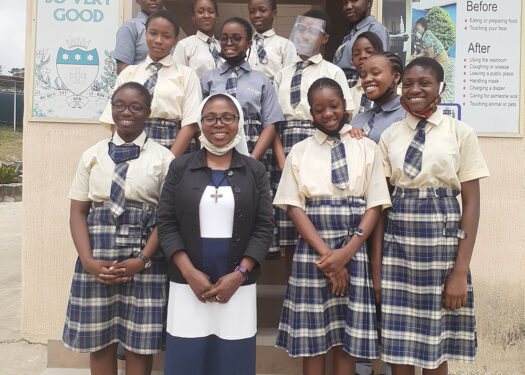
by Elise Ann Allen
ROME (Crux) — This fall, several organizations are banding together to recognize what they’re calling the “unsung heroes” in the fight against modern slavery and human trafficking, by offering an award to three women religious engaged in anti-trafficking efforts.
In partnership with the International Union of Superiors General (UISG), the largest global umbrella organization of women religious, and the Conrad N. Hilton Foundation, the Arise anti-trafficking organization is preparing to host an awards ceremony honoring Catholic nuns engaged in the prevention of trafficking and modern slavery throughout the world.
The ceremony, dubbed the “Sisters Anti-Trafficking Awards,” will take place Oct. 31 in London, during which three nuns will be given an award and $20,000 to allocate toward a development program of their choosing.
The awards presented to the sisters include The Common Good Award, which according to the SATAs website is “for courage and creativity in addressing exploitation.
“Despite adverse conditions and sometimes scarce resources, sisters’ resourcefulness and dedication are leading to effective and sustainable work against trafficking across the world. This award winner will have demonstrated creativity and courage in their anti-trafficking interventions,” a description of the award says.
The Servant Leadership Award will also be given in recognition of “excellence in network-building.
“Embedded in their communities, sisters are often uniquely placed to lead through service and develop long-term anti-trafficking systems and networks. This award winner will have contributed to the growth of such networks and have facilitated collaboration across cultures and religions,” the description says.
Finally, the Human Dignity Award will be given “for a lifetime achievement in addressing exploitation.”
A description of the award says that the work sisters do to combat trafficking “is often due to their familiarity with local customs and vulnerabilities, and the trust they have from local communities.”
That award will be presented to a sister who has been committed to anti-trafficking work for at least 15 years, and whose efforts have proven “impactful and sustainable.”
Among the most recognized anti-trafficking organizations led by women religious is the Talitha Kum “network of networks,” composed of over 6,000 members running more than 20 networks in over 90 countries.
The Arise Foundation itself in their 2021 annual report stated that there were nearly 50,000 direct beneficiaries of their work that year, and they supported roughly 6,000 families in over 70 cities in 2021
Members of the organization have sought to fill what they described as a gap in anti-trafficking efforts by “creating networks of frontline activists, NGOs, and religious sisters, and supporting their work against slavery in their own communities.”
With a team of a dozen people, the foundation has focused on providing basic support to victims and emergency assistance.
According to a press release announcing the awards, the honors intend to “raise the profile of the valuable work of sisters, encourage collaboration within the anti-slavery sector, and to deepen the protection of communities vulnerable to trafficking worldwide.”
The committee charged with selecting the award recipients from the numerous nominations that have already begun to flood in include survivors of trafficking, advocates, Vatican representatives, and women religious belonging to the UISG and who work with various anti-trafficking organizations.
According to statistics available on the Arise website and the United Nations International Labor Organization, the 2022 Global Slavery Index states that there are an estimated 49 million people enslaved on any given day.
Drawing a clear distinction between modern slavery and human trafficking, Arise reports that 8.4 million children throughout the world are currently victims of some form of exploitation, and that roughly 1 in 4 modern slavery victims are children.
Children represent around 18% of those engaged in forced labor, and amount to 21% of sex trade victims.
Organ trafficking, though like general numbers for trafficking and slavery is notoriously hard to measure accurately, is also an illegal trade that annually yields between $600 million to $1.2 billion in profit.
An estimated 4.8 million people are currently enduring sexual exploitation, around 99% of whom are women and children. Roughly 7 in 10 of these people live in Asia and the Pacific region.
Over 50% of all human trafficking victims are forced into the sex trade, which annually generates a profit of $99 billion, with an increased demand for illegal online sex activities post-COVID-19.
Arise also works with victims of forced labor, who number an estimated 20.1 million, many of whom are coerced through tactics such as violence and intimidation, or debt accumulation and document retention.
Most victims of forced labor are enslaved in the private sector and suffer various forms of coercion, such as the withholding of wages, and threats or acts of violence against them or their families.
Speaking of the awards, Martin Foley, CEO of Arise, said that “across countless high-risk regions, we find challenging, unglamorous but highly effective anti-trafficking work being carried out by Catholic sisters.”
The work nuns do “includes survivor rehabilitation, income generation, school enrollment, community vigilance projects, and awareness campaigns,” Foley said. “It’s high time these efforts were celebrated and learned from.”
Sister Patricia Murray, executive secretary for the UISG, stressed the importance of collaboration, saying, “While the awards honor sisters for their courage and creativity, collaboration with many people from different faith traditions and with women and men of goodwill is key to combating the scourge of human trafficking which disfigures human dignity.”
